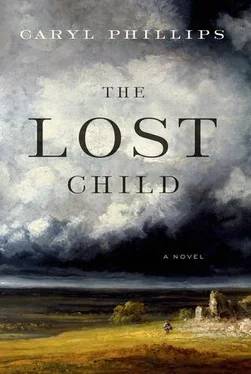* * *
Really, had they ever delighted in a close intimacy? Truly close? Six years ago they left Yorkshire and journeyed south to London before continuing on to Belgium. Two moderately impetuous maiden sisters travelling together, submitting themselves to a heroic adventure in the hope of acquiring an improved proficiency in the French language. They fully understood they were neither attractive nor fashionable, but they had been raised to eschew the approval of others. Papa had reluctantly given his blessing, and he hoped that they would watch over each other and safely deliver themselves back to his doorstep. After all, what could he do? Perhaps journeying was in the girls’ blood? His own pilgrimage had taken him from the Ireland of his birth to Cambridge, where he had studied with anxious intensity as a shy and stammering commoner. His transformation from Patrick Brunty to Patrick Brontë fooled no one, and his attempts to scour the Irish brogue from his tongue and his halfhearted endeavour to dress above his station provoked ill-suppressed laughter. His priggish mien grew more intense and silent as he became aware that to his contemporaries he was an object of entertainment, and the handful of undergraduates he regarded as potential intimates soon began to avoid the ignominy of being seen in his orbit. The final stage of his own adventure saw him migrate north to Yorkshire, where he felt no inclination to impress any among his flock, and where he maintained an aloof and zealously gauged distance from the people of Haworth.
She peered into the churning waters of the tempest-tossed English Channel and realized that with this moonlit voyage she was now roaming beyond her dear father’s imagination. The waves lashed the sturdy vessel, and she clung with wet hands to the rail and reeled back and forth, allowing herself to be baptized by the haze of briny spray. Charlotte was held securely in the clench of seasickness, and lay below deck, turning restlessly on her bunk, but she understood there was little she could do to alleviate her sister’s turmoil. Charlotte had dropped and declined hurriedly, but Emily knew that this affliction would soon be resolved after a short, hard conflict that, at this stage, would benefit little from the consolation of human empathy. Above her the black sky was choked with stars, the same glorious constellation that jolted her sensibility on her late-night walks behind the Parsonage. She greeted her familiar heavenly companions and ignored the cry of yet another crew member who urged the long-legged woman to leave the deck. Ma’am, please. It will be safer for a lady down below. No doubt, no doubt. She offered the terrified young man an upwardly tilted chin and the faintest trace of a smile, before familiarizing him with her willowy back. She was travelling home tonight in the company of a forbidding wind. Young man, if it will bring you peace, then you must take shelter. Again she lifted her head to the skies. Let those who need shelter seek it out. She whispered, Go, seek it out.
Through the bleary windows of the carriage the sisters could see little but flat, ill-manicured land swimming out in all directions, and only the occasional scruffy village disrupted the monotony. After some time the villages began to embrace one another and form a town, and suddenly the town began to grow into a city. Brussels revealed itself without the fanfare of London’s vociferous certitude. A continental city, melancholic in appearance, apologetic in tone, it remorsefully busied itself as though afraid to be discovered slacking. Her sister retained a pallid countenance from the exertions of the crossing, and once again she closed her heavily lidded eyes and allowed her head to loll sideways against the glass. Then Charlotte blinked furiously, as though embarrassed to have been caught in a moment of weakness, and she watched as her debilitated sister adjusted her slumped posture and readdressed her attention to the spectacle of the somewhat overcast city they had now entered.
Like a prison , she wrote. Dear Anne, Monsieur Heger’s school is like a prison with its high stone walls and heavy press of silence. I feel an iron weight constantly anchoring me to the earth. He simply wishes me to imitate the style of others, thus obscuring my own vision. I am twenty-four years of age and see no reason to stoop before the tyranny of this senseless man. In this school of learning I learn nothing except how to retreat into myself and survey the world about me with apathy. I am stimulated by little except the unwelcome aroma of one tedious day exhaling into the next, and time carries me forward against my will. She informed her fragile sister that her French had improved considerably, so much so that she was able to think and even dream in the language, but Monsieur Heger was almost certainly not the cause of her advancement. She characterized him as a young man who exuded an elaborate sincerity that was ruined by his determination to grin and display his polished teeth. She read constantly, and having made a selection from the books in the small library at the back of the single classroom, she would bustle back to the tiny quarters that she shared with her travelling companion and once again indulge herself. A freshly rejuvenated Charlotte regularly volunteered for extra lessons with the master, and Emily therefore often enjoyed sole occupation of their room and was able to fully embrace her moody solitude. Occasionally she would venture forth and stroll in the gardens, where she risked encountering her captivated sister listening attentively to whatever it was her master was saying to her, the pair of them oblivious to her ghostly presence. At such moments, she made it her business to seek out the shadow of a broad tree that might enable her to linger unobserved. Poor Charlotte, who gazed upon the professor with ill-disguised ardour, was abandoning the modest dignity of an inner life for the farce of a fluttering heartbeat. In Brussels.
On Sundays they travelled out into the city and visited with a family with whom their father had connections, the origins of which were buried beneath any clear understanding on the part of either sister. However, after a half-dozen Sundays, the visits began to corrode into an obligation, which Charlotte tried desperately to make light of by taking control of the conversational territory. While riding the carriage towards their destination, her sister regularly compiled a list of topics to be discussed, and she rehearsed the order in which the subjects were to be raised. On encountering this insipid continental family, whose cakes and teas they both found unspeakable, it was Charlotte alone who made the effort to rescue the afternoon from catastrophe, while Emily retreated into an implacable silence that hinted at shyness, although her lustreless eyes invariably betrayed boredom, and her general demeanour indicated that she cared little for anyone else’s opinions.
Late on Sunday night, the two sisters would prop themselves up in their uncomfortable beds and read their grammars. She oftentimes stole a look at Charlotte and silently apologized for her behaviour. She understood that her well-practised hostility made it impossible for Charlotte to engage in elegant repartee with their hosts, and the deathly quiet return journey in the lumbering carriage would be interrupted only by Charlotte gathering herself and then meekly scolding her headstrong sister. As daylight began to fade and their passage home continued, she would glance briefly at a discomfited Charlotte but say nothing, which seemed to temporarily satisfy her older sister, who, for some reason, always appeared to be transfixed by the cheerless views of the streets of Brussels through the begrimed windows of their carriage.
She stood in the cooling shadow of a spreading beech tree, her back to the pitted bark, her toes steadfastly gripping the soles of her shoes, which, in turn, marked the grass. The master was once again displaying himself in an immaculately tailored suit of clothes, and encouraging the overly studious gazing of the young woman who sat obediently next to him. It was unmistakable, to all but the besotted, that his allure was undermined by his inability to move beyond his charm. He stood and took his leave, playfully lacing his way through a line of trunks and ambling towards the elegantly carved door. He threw a quick, final glance in the direction of the bench, a look calculated to cast himself in a kindly light, before nimbly mounting the three steps and disappearing into the house where his wife would no doubt be waiting patiently for him. She watched Charlotte lift the plain envelope to her face with both hands and then smell its scent. This man was operating upon her with a fully conscious determination. Once again her sister drew the perfumed air to her and allowed it to overwhelm her senses. A fragrance meaning what exactly? From her concealed location, she witnessed poor Charlotte drift.
Читать дальше












